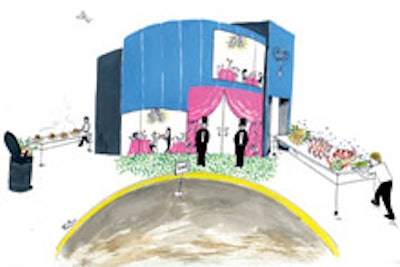
Illustration: Fernanda Cohen for BizBash
There are great caterers, and then there are those whose style could be most kindly be described as “high school cafeteria.” And when the latter is ensconced as the in-house caterer at an otherwise to-die-for location, what’s an event producer to do?
“Unfortunately, you can’t turn cooks into quality chefs overnight,” says Loretta Lowe, a San Francisco-based meeting and event planner. “Once I handled an event at a venue that was used to doing budget weddings, [with] prefrozen appetizers and the like.” Their idea of upgrading the menu, she says, was adding toothpicks to a cheese-cube platter. “The most hilarious bit was when they proudly told me they were serving ‘green bean almondine,’ which consisted of canned green beans and a bag of presliced almonds, which they mixed together and then boiled.”
Obviously, caterers are rarely this off the mark, but great spaces often have contract vendors that you might not book if you had the choice. Maybe they don’t specialize in the cuisine that coordinates with your vision of the event, or maybe they’re just not quite up to the level of cooking that you—and your guests—are expecting.Sure, as a general rule, “quality locations definitely align themselves with the more upscale caterers,” says Karen Knox, manager of meetings management for Blue Cross and Blue Shield of North Carolina. “They’re not going to provide a great location, the best technology, and then have catering that’s not so great.”
Still, Knox says she has used facilities where the catering crew wasn’t up to her standards, and even the most seasoned event specialists sometimes have to deal with lackluster food service. So how do you prevent a dinner disaster in situations like this? Some reverse psychology can help, and it nearly always takes extra money, but the additional work can ensure a meal that will be memorable for the right reasons.
See how much they know. While conducting a tasting is a standard way to get a baseline impression of a venue’s catering savvy, another good barometer is their body of knowledge. “I don’t spell everything out at first,” says Brian Acheson, owner of VIP Events in Dallas. “It’s a great way to gauge their experience and their depth of knowledge.” For instance, if you say you want Asian food and they say “O.K.” without asking follow-up questions, you might not be thrilled with the results.
Acheson recalls one tasting at an upscale banquet venue in Orlando. “We’d emphasized that this was a well-traveled group, and we asked for a menu with an Italian theme,” he says. Rather than ask whether the group would prefer risotto, gnocchi, or tagliatelle, the caterer cranked out an underwhelming platter of spaghetti and meatballs.
“It’s not exactly what we were looking for out of a place of that caliber,” he says. “It didn’t knock your socks off—and that was for a tasting group of five.”
Convey your expectations clearly and early. If Knox gets a sense that a chosen venue is accustomed to turning out rubber-chicken dinners, she sits down with the food-service director for a long, detailed discussion of what her group expects and, more importantly, how the venue can reach that expectation. “At times, especially at state or academic facilities, they’re used to groups with more limited budgets,” she says. “[But] we’re not afraid to make suggestions, even to higher-end hotels.”
Ask for something difficult. Kevin White, director of production at Empire Force Events in New York, admits he’s not afraid to scare off a middling caterer. “If you come in saying you need authentic Mandarin cuisine or something you know in advance they can’t provide, you can often get the house caterer to back down,” he says.
For one event in New York, White and his client drew up a regional U.S. barbecue menu set up to show the nuances of Texas, Kansas City, and South Carolina styles. When the caterer blanched at the task, White said they’d already lined up Danny Meyer’s Blue Smoke restaurant—which specializes in barbecue—to tackle the menu. The caterer, White says, was all too happy to turn over his toque.
Or maybe ask for something simple. On the other hand, a kitchen staff that might not be able to turn out multiple courses for 250 might be able to execute something with fewer frills satisfactorily. “In situations where my clients are limited to one caterer and aren’t wowed by the quality, I get a full list of hors d’oeuvres, stations, and buffet options, and pick and choose items that will fit with their event’s theme but will actually get eaten,” says Bess Devenow, vice president of special events and marketing for New York-based Ripe Events. “There’s nothing worse than being stuck with a sit-down dinner that goes uneaten.”
When cherry-picking items, Devenow says she often gravitates toward bite-size versions of childhood favorites and comfort food: While they’re not the most original choices, they are easy enough for even an average cook to prepare.
Focus on presentation. All the garnishes in the world won’t redeem an overcooked steak, but presentation does make a difference. For the opening-night bash at a conference of 500 at a new, untested hotel in Macau, China, Holly Monahan, conference and event manager for the Nielsen Business Media Film Group, opted for several stations featuring various Asian cuisines and a flowing, open arrangement.
“This event really made a great impression, as opposed to something more traditional, which wouldn’t have been as memorable,” Monahan says. A big part of the appeal was the visual spectacle that ramped up the excitement and novelty factor: “They had a lot of little touches that made the presentation really outstanding, down to watermelons sculpted into flower decorations.”
Try to negotiate. When catering requirements aren’t governed by union regulations, the mandate to use the in-house team is often just a case of the venue wanting to generate additional revenue. In this case, many producers say that offering the venue the opportunity to handle the bar and purchase the food may be all you need to open the door for a caterer of your choosing.
“You can’t screw up a bar, and liquor is where a venue makes the most money,” points out Kevin White, who’s gotten venues to bend the catering rules if he lets them handle the big-ticket parts of the event.
Be aware, however, that while a venue might trade off letting you select another caterer to do the cooking if the venue can provide the food, you might have to be vigilant to make sure you get the quality—not to mention the actual items—that you need. “When one venue looked at our list of ingredients, they told us they planned to substitute chicken liver for foie gras,” says Andrea Michaels, president of Extraordinary Events in Los Angeles. “We had to tell them that they aren’t even similar, and they had a tough time understanding that.”
Add to the team. If the venue absolutely won’t let you bring in a different caterer, several event producers suggest bringing in a more adept chef as a consultant. “Sometimes clients book me to work with a house caterer on menu development and presentation, and sometimes I bring in a staff of five or six to help with the cooking, as well,” says Joann Roth-Oseary, owner of Los Angeles-based catering company Someone’s in the Kitchen.
While it is more expensive for the event host to hire essentially two companies to do the cooking, Roth-Oseary says venues that won’t cede control of their kitchens can often be persuaded to share. She once brought the in-house staff up to snuff at a major Chicago venue. “They were doing some kind of fajita that was really tough and not flavorful at all,” she says. She convinced the staff to use small amounts of a better cut of meat, plus more inventive seasonings.
Drop some names. While not everyone—or every event—can hire a Food Network regular to get around contract regulations, producers who come in with big-name chefs typically get deferential treatment.
When Andrea Michaels did a 10-city tour of convention centers for Mercedes with Daniel Boulud, kitchen managers in some cities were initially reluctant to turn over the reins. But when she pointed out that their staffers would get to work with—and learn from—the famous chef, they couldn’t resist the chance to work with a culinary A-lister and agreed to let his sous chefs oversee their work. “They didn’t even ask us to pay a premium for bringing in an outside chef,” she says.
Get it in writing. Of course, it’s much easier to do all of this if it’s written into your contract that you can use your own caterer or bring one in to oversee the venue staff. When it comes to convention centers in particular, start early, says Tyra Hilliard, an events lawyer and consultant, because you’ll need to get facility management as well as the catering company to sign off on any exceptions to food-service regulations. Since liability is a big reason for exclusivity agreements, Hilliard suggests that a possible way to get around it is to have your preferred caterer bring portable kitchens.
When in doubt, buy it out or walk away. Some specialists prefer to buy out venues, arguing that a location’s appeal can be ruined by cooks who turn out fare that doesn’t match the setting. While it’s not cheap—one New York event producer says he’s been quoted anywhere from $30 to $80 extra per person to buy out a venue—it can be done.
The last resort? “I hate to say, ‘Just walk,’ but in some cases it’s just better,” says Brian Acheson. “No matter how great the venue is, if the food is horrible, it’s going to negatively impact the event.”
“Unfortunately, you can’t turn cooks into quality chefs overnight,” says Loretta Lowe, a San Francisco-based meeting and event planner. “Once I handled an event at a venue that was used to doing budget weddings, [with] prefrozen appetizers and the like.” Their idea of upgrading the menu, she says, was adding toothpicks to a cheese-cube platter. “The most hilarious bit was when they proudly told me they were serving ‘green bean almondine,’ which consisted of canned green beans and a bag of presliced almonds, which they mixed together and then boiled.”
Obviously, caterers are rarely this off the mark, but great spaces often have contract vendors that you might not book if you had the choice. Maybe they don’t specialize in the cuisine that coordinates with your vision of the event, or maybe they’re just not quite up to the level of cooking that you—and your guests—are expecting.Sure, as a general rule, “quality locations definitely align themselves with the more upscale caterers,” says Karen Knox, manager of meetings management for Blue Cross and Blue Shield of North Carolina. “They’re not going to provide a great location, the best technology, and then have catering that’s not so great.”
Still, Knox says she has used facilities where the catering crew wasn’t up to her standards, and even the most seasoned event specialists sometimes have to deal with lackluster food service. So how do you prevent a dinner disaster in situations like this? Some reverse psychology can help, and it nearly always takes extra money, but the additional work can ensure a meal that will be memorable for the right reasons.
See how much they know. While conducting a tasting is a standard way to get a baseline impression of a venue’s catering savvy, another good barometer is their body of knowledge. “I don’t spell everything out at first,” says Brian Acheson, owner of VIP Events in Dallas. “It’s a great way to gauge their experience and their depth of knowledge.” For instance, if you say you want Asian food and they say “O.K.” without asking follow-up questions, you might not be thrilled with the results.
Acheson recalls one tasting at an upscale banquet venue in Orlando. “We’d emphasized that this was a well-traveled group, and we asked for a menu with an Italian theme,” he says. Rather than ask whether the group would prefer risotto, gnocchi, or tagliatelle, the caterer cranked out an underwhelming platter of spaghetti and meatballs.
“It’s not exactly what we were looking for out of a place of that caliber,” he says. “It didn’t knock your socks off—and that was for a tasting group of five.”
Convey your expectations clearly and early. If Knox gets a sense that a chosen venue is accustomed to turning out rubber-chicken dinners, she sits down with the food-service director for a long, detailed discussion of what her group expects and, more importantly, how the venue can reach that expectation. “At times, especially at state or academic facilities, they’re used to groups with more limited budgets,” she says. “[But] we’re not afraid to make suggestions, even to higher-end hotels.”
Ask for something difficult. Kevin White, director of production at Empire Force Events in New York, admits he’s not afraid to scare off a middling caterer. “If you come in saying you need authentic Mandarin cuisine or something you know in advance they can’t provide, you can often get the house caterer to back down,” he says.
For one event in New York, White and his client drew up a regional U.S. barbecue menu set up to show the nuances of Texas, Kansas City, and South Carolina styles. When the caterer blanched at the task, White said they’d already lined up Danny Meyer’s Blue Smoke restaurant—which specializes in barbecue—to tackle the menu. The caterer, White says, was all too happy to turn over his toque.
Or maybe ask for something simple. On the other hand, a kitchen staff that might not be able to turn out multiple courses for 250 might be able to execute something with fewer frills satisfactorily. “In situations where my clients are limited to one caterer and aren’t wowed by the quality, I get a full list of hors d’oeuvres, stations, and buffet options, and pick and choose items that will fit with their event’s theme but will actually get eaten,” says Bess Devenow, vice president of special events and marketing for New York-based Ripe Events. “There’s nothing worse than being stuck with a sit-down dinner that goes uneaten.”
When cherry-picking items, Devenow says she often gravitates toward bite-size versions of childhood favorites and comfort food: While they’re not the most original choices, they are easy enough for even an average cook to prepare.
Focus on presentation. All the garnishes in the world won’t redeem an overcooked steak, but presentation does make a difference. For the opening-night bash at a conference of 500 at a new, untested hotel in Macau, China, Holly Monahan, conference and event manager for the Nielsen Business Media Film Group, opted for several stations featuring various Asian cuisines and a flowing, open arrangement.
“This event really made a great impression, as opposed to something more traditional, which wouldn’t have been as memorable,” Monahan says. A big part of the appeal was the visual spectacle that ramped up the excitement and novelty factor: “They had a lot of little touches that made the presentation really outstanding, down to watermelons sculpted into flower decorations.”
Try to negotiate. When catering requirements aren’t governed by union regulations, the mandate to use the in-house team is often just a case of the venue wanting to generate additional revenue. In this case, many producers say that offering the venue the opportunity to handle the bar and purchase the food may be all you need to open the door for a caterer of your choosing.
“You can’t screw up a bar, and liquor is where a venue makes the most money,” points out Kevin White, who’s gotten venues to bend the catering rules if he lets them handle the big-ticket parts of the event.
Be aware, however, that while a venue might trade off letting you select another caterer to do the cooking if the venue can provide the food, you might have to be vigilant to make sure you get the quality—not to mention the actual items—that you need. “When one venue looked at our list of ingredients, they told us they planned to substitute chicken liver for foie gras,” says Andrea Michaels, president of Extraordinary Events in Los Angeles. “We had to tell them that they aren’t even similar, and they had a tough time understanding that.”
Add to the team. If the venue absolutely won’t let you bring in a different caterer, several event producers suggest bringing in a more adept chef as a consultant. “Sometimes clients book me to work with a house caterer on menu development and presentation, and sometimes I bring in a staff of five or six to help with the cooking, as well,” says Joann Roth-Oseary, owner of Los Angeles-based catering company Someone’s in the Kitchen.
While it is more expensive for the event host to hire essentially two companies to do the cooking, Roth-Oseary says venues that won’t cede control of their kitchens can often be persuaded to share. She once brought the in-house staff up to snuff at a major Chicago venue. “They were doing some kind of fajita that was really tough and not flavorful at all,” she says. She convinced the staff to use small amounts of a better cut of meat, plus more inventive seasonings.
Drop some names. While not everyone—or every event—can hire a Food Network regular to get around contract regulations, producers who come in with big-name chefs typically get deferential treatment.
When Andrea Michaels did a 10-city tour of convention centers for Mercedes with Daniel Boulud, kitchen managers in some cities were initially reluctant to turn over the reins. But when she pointed out that their staffers would get to work with—and learn from—the famous chef, they couldn’t resist the chance to work with a culinary A-lister and agreed to let his sous chefs oversee their work. “They didn’t even ask us to pay a premium for bringing in an outside chef,” she says.
Get it in writing. Of course, it’s much easier to do all of this if it’s written into your contract that you can use your own caterer or bring one in to oversee the venue staff. When it comes to convention centers in particular, start early, says Tyra Hilliard, an events lawyer and consultant, because you’ll need to get facility management as well as the catering company to sign off on any exceptions to food-service regulations. Since liability is a big reason for exclusivity agreements, Hilliard suggests that a possible way to get around it is to have your preferred caterer bring portable kitchens.
When in doubt, buy it out or walk away. Some specialists prefer to buy out venues, arguing that a location’s appeal can be ruined by cooks who turn out fare that doesn’t match the setting. While it’s not cheap—one New York event producer says he’s been quoted anywhere from $30 to $80 extra per person to buy out a venue—it can be done.
The last resort? “I hate to say, ‘Just walk,’ but in some cases it’s just better,” says Brian Acheson. “No matter how great the venue is, if the food is horrible, it’s going to negatively impact the event.”



















